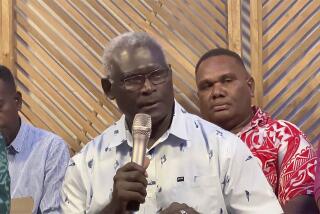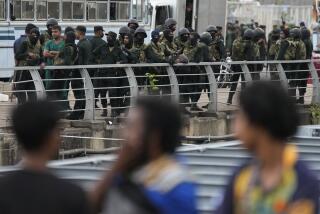Two Groups Claim to Be in Control After Coup in Fiji
- Share via
SUVA, Fiji — The army colonel who led a bloodless coup named a new government today but the governor general, a chieftain who is Queen Elizabeth II’s representative, said he had assumed executive power.
It was unclear who was in charge since Lt. Col. Sitiveni Rabuka and about 10 soldiers stormed Parliament at mid morning, placing Prime Minister Timoci Bavadra and his entire Cabinet under arrest. The coup against Bavadra’s month-old government was the first in the South Pacific.
Several hours after the coup, Governor General Ratu Sir Penaia Ganilau declared a “public emergency” and said he had assumed executive power under the constitution, which was written by the British.
Ganilau, whose office normally has little power, declared in a radio broadcast that he was taking immediate steps to “restore the lawful situation.” Queen Elizabeth is formal head of state of Fiji, which is a member of the Commonwealth.
He told Rabuka and his rebel followers to return to their barracks. As governor general, Ganilau is the nation’s commander in chief.
The lieutenant colonel responded by ordering the station to stop broadcasting and announcing a 15-member “council of ministers” that he said would govern until he has a new constitution drafted and calls national elections. He designated the former prime minister, Ratu Sir Kamisese Mara, as foreign minister.
Mara, a 66-year-old hereditary high chief who is staunchly pro-Western, had led every government since independence from Britain in 1970.
Bavadra, also a native Fijian, defeated him last month and formed the first Cabinet with an ethnic Indian majority. Ethnic Indians outnumber ethnic Fijians 49% to 47% in the 300-island archipelago.
Fiji, a popular tourist area, has a population of 715,000. Indians, many of whom are descended from indentured laborers brought in to work on British-run sugar plantations in the 19th Century, now dominate the islands’ commerce.
Ethnic Fijians traditionally have controlled the government.
More to Read
Sign up for Essential California
The most important California stories and recommendations in your inbox every morning.
You may occasionally receive promotional content from the Los Angeles Times.










